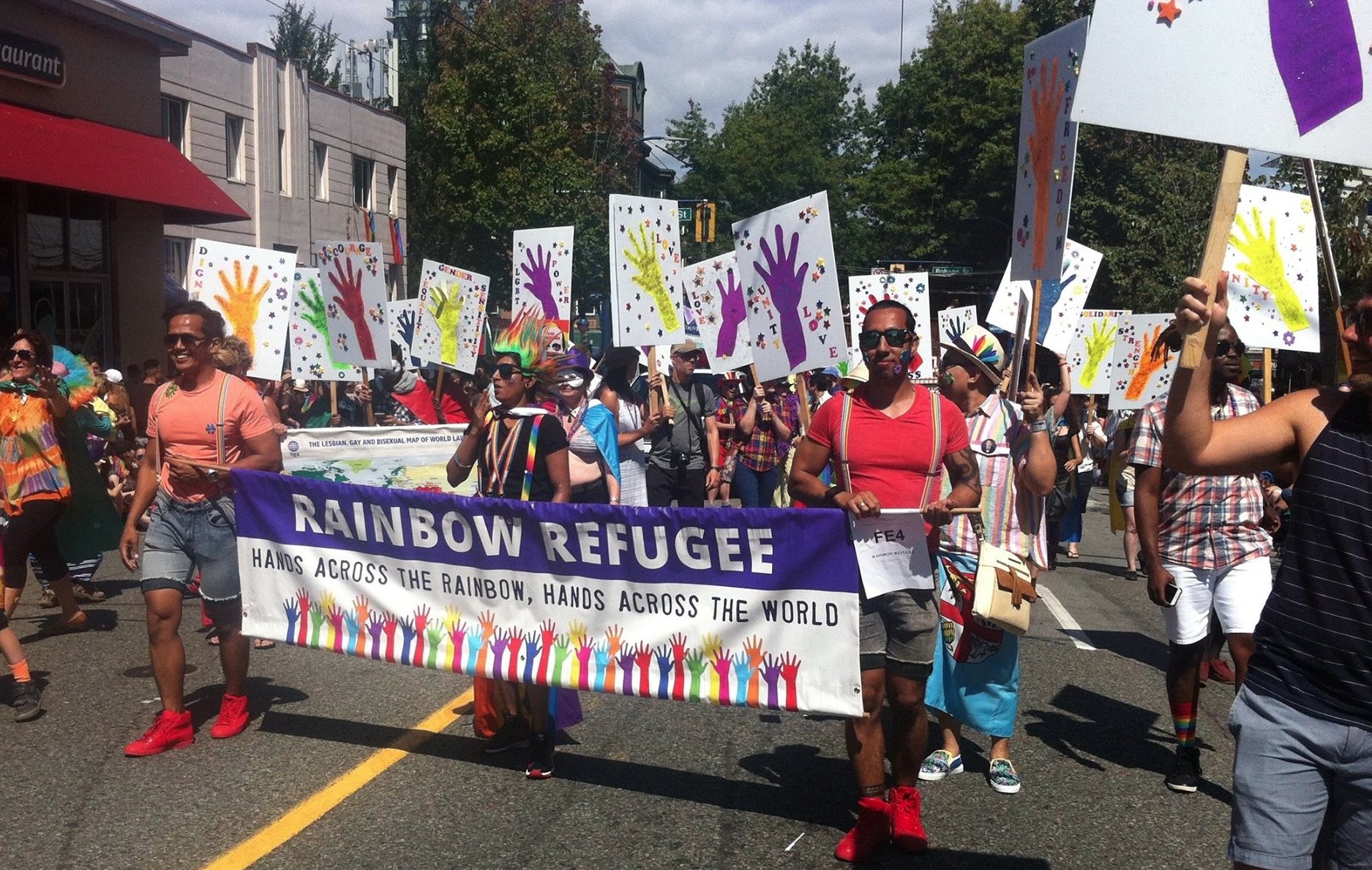For the first time in 10 years, Rainbow Refugee will not march in the Vancouver Pride parade.
The sponsorship and support group for LGBT refugees announced its decision on Facebook on July 28, 2017, citing its concerns over the participation of police in the parade, and the police force’s ongoing collaboration with the Canada Border Services Agency.
“Rainbow Refugee members come from a wide range of backgrounds and more than 40 different countries where members faced homophobic, transphobic and HIV related persecution from both the general public and the State,” the group’s chair, Sharalyn Jordan, writes in the post.
For many members, the experience of being cheered as they walk openly along the Pride parade route has been transformative. Some members have also been “impressed and reassured” by seeing police walk in the parade, and some value the relationship built with police as an achievement, Jordan writes.
But others have “expressed deep fear and mistrust of police,” the post reads. “Police forces across Canada have not adequately addressed systemic racism, discrimination and abuse.”
“As much as Rainbow Refugee wishes to celebrate and demonstrate for the rights and pride many of us enjoy in Vancouver, we support the members of Rainbow Refugee, and other communities, who do not yet receive equal protection, safety and respect from Canadian law enforcement,” Jordan writes.
After careful consultation with its members, Rainbow Refugee’s board decided the group will participate in the annual Dyke March and the Vancouver Pride Society’s inaugural human rights panel on refugees on Aug 3, but must pull out of the parade, Jordan told Xtra by phone on July 31.
Jordan says Rainbow Refugee was hopeful that Vancouver police would follow the lead of police in cities like Halifax, whose force voluntarily withdrew from the parade, and Winnipeg, whose force agreed to march without uniforms.
They’re disappointed in Vancouver police and the Pride Society’s attempt at compromise here.
“I’d like to see the police choose not to wear the uniforms and symbols of power that feel unsafe to racialized people; come as themselves for one year and see what that’s like,” Jordan says. “A compromise that doesn’t drop the symbols of power isn’t really a compromise.”
Of particular concern, Jordan says, is the Vancouver Police Department’s collaboration with the Canada Border Services Agency. CBSA marched in the parade in 2009 in uniform, but hasn’t marched since 2014, according to Pride Society records.
“The detention policies of CBSA are enforced by our local police, who are very racist in terms of who gets targeted for detention,” Jordan alleges. “We would need to see the VPD no longer collaborating with CBSA because CBSA detains and deports people and has no independent civilian oversight.”
The City of Vancouver’s access-without-fear policy, passed in April 2016 and promising all residents access to city services without questioning their immigration status, lulls racialized minorities into a false sense of security in the way that it’s currently administered by Vancouver police, Jordan suggests.
“Their attempt to operationalize the access-without-fear policy uses the words, but there’s no substance to it whatsoever,” Jordan alleges. “It makes people less safe and gives the impression there is access without fear. That may not be the particular ask of other groups, but it’s one of our major concerns.”
Vancouver Pride’s co-executive director says she respects Rainbow Refugee’s decision.
“They sent us their letter in advance as we had multiple, very open and caring discussions about their participation and stance,” Andrea Arnot tells Xtra in an email. “We will continue to work with them and will continue dialogue in our off season.”
Pride co-chairs Charmaine de Silva and Michelle Fortin say they too support Rainbow Refugee’s decision and the way in which they made it.
“They, and a number of other organizations, have had to make a very challenging decision,” Fortin said in a Facebook live interview with Xtra on July 31. “But they’re standing by to support a small and very vulnerable group of folks, and I think that they’ve done that in a really respectful way. Their conversations with us have been above-board and proactive.”
Fortin says the Pride Society values its allies who are not marching in this year’s Pride parade. “They’re taking a stand,” she says, “and that’s okay.”
“They have every right to have diverse opinions,” she adds.
“We support that,” de Silva agrees. “You have to, as an organization, be listening to the people who are speaking to you.”
There’s more to Pride than the parade, de Silva adds. There are other events throughout the week and throughout the year, she says, and the Pride Society appreciates and supports those spaces too. “There’s a lot of good work going on, and I hope that that continues.”
It’s important to continue to engage with people who have different perspectives, Fortin says. “We believe we need everybody in the boat to be able to move forward.”
Rainbow Refugee, whose members participated in Pride’s community consultations over the past year, hopes some of its members will also participate in the listening circles with police officers that Pride has promised to organize in the future, Jordan says.
The Pride parade will take place in Vancouver on Aug 6, 2017.
Editor’s note, Aug 3, 2017: A previous version of this article called it the Canadian Border Services Agency rather than the Canada Border Services Agency. This article has also been corrected to show that the Canada Border Services Agency has not participated in the Pride parade since 2014. Rainbow Refugee’s concerns pertain to the Vancouver police force’s participation in the parade while it continues to collaborate with CBSA. The group is also concerned about the police administration of the city’s access-without-fear policy, not the policy itself.

 Why you can trust Xtra
Why you can trust Xtra


